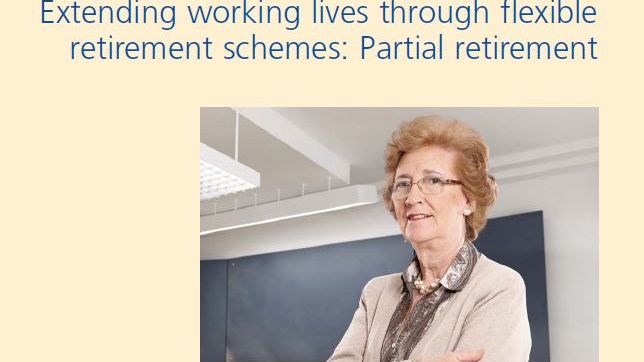
Blog post -
Working longer by working less?
In the following blog piece, originally posted in Social Europe Journal, Eurofound Research Manager Hans Dubois looks at the potential of partial-retirement to extend working lives in Europe, and improve the sustainability of pension schemes.
There are limits to the effectiveness of member states’ pension reforms…
Europe, it’s often said, is experiencing a worsening ageing crisis. European governments grappling with this and the related unsustainability of many pension schemes have taken measures to keep older workers longer in employment. But reforms such as raising the pension age and discouraging early retirement are ineffective for many people who are unable, or not motivated, to work until the pension age.
As highlighted by the EU’s recent Ageing report, many Member States who have taken these reforms have improved the sustainability of their pension systems, along the lines of various Annual Growth Surveys and the EU’s 2012 Agenda for Adequate, Safe and Sustainable Pensions. However, Member States have also seen the limitations to the reforms’ effectiveness.
…And partial retirement can address this
One way to motivate and enable people close to the retirement age to extend their working lives is to reduce their working hours.
In the EU, over a quarter (27%) of workers say they are unable to work until 60, according to the 2015 European Working Conditions Survey. How can these workers be enabled to work longer? A Swedish survey revealed a ‘reduction of working hours’ to be the most important enabler: 60% of workers aged 50-64 who report to be unable to work until the retirement age say this would enable them. Earlier research by Eurofound further shows that 45% of workers aged 50 or over would prefer to work fewer hours, taking into account their financial needs.
For many people, though, such reductions may not be feasible as they cannot afford the drop in income. If people can draw part of their pensions early, this facilitates such reductions and may thus extend their working lives. Such ‘partial retirement’ schemes may come at the cost of lower future pensions, but the longer working lives can, at the same time, enhance pension entitlements. Working time reductions may even stimulate people to work after the retirement age, as is becoming increasingly common. More than 5m aged over 65 were employed in 2014. A Eurobarometer survey showed that in 2011, about two-thirds (65%) of people in the EU find it more appealing to ‘combine a part-time job and partial pension instead of full retirement’.
But, partial retirement schemes vary…
Eurofound has identified partial retirement schemes at the national and sector level in over half of the EU Member States and in Norway. These schemes differ greatly in their design. Usually partial pensions require reductions of working hours, with limited flexibility. For example, in the Belgian national scheme working time is reduced to 80 or 50%. However, the schemes in countries with earliest experiences of partial retirement do not require (but do facilitate) such reductions: Norway, Sweden, and Finland from next year. Sometimes schemes are designed as ‘phased retirement schemes’, to phase-out work gradually. In several sector level schemes in the Netherlands, for example, it is not possible to decrease or stop pension receipt once a partial pension is initiated. Other schemes allow reversals, increasing working hours again and decreasing pension receipt, for example following periods when workers may need time to take care of relatives or partners. The French scheme allows partial retirees to change their working hours each year to anywhere between 40% and 80% of full working time, and their pensions are then recalculated.
…And they are not always effective
According to our study, partial retirement schemes often reduce total lifetime working hours for many, and none of the investigated schemes clearly has extended working lives as a whole. However, partial retirement has certainly extended working lives for some people.
For example, a 2007 survey among Finnish partial retirees revealed that 11% of them would have retired fully straight away had partial retirement not been available. This proportion was particularly high among partial retirees who reported to have bad health: 28% would not have continued working at all had partial retirement not been available. However, more (49%) people who took up partial retirement would have continued working full-time until the retirement age, were the partial scheme not available.
The challenge is to design the scheme in a way that it is only taken-up by people whose working life is extended by it. Only in that case will it trigger continued pension contributions and delay full pension withdrawal, and thus contribute to secure pension systems.
How to make partial retirement effective?
It is important to get the incentives right: partial retirement should be designed to compete effectively with alternative full early retirement schemes, but full-time work should still be encouraged. Schemes should also be easy to use and administer. Some schemes failed because people were unaware of their existence, or of being entitled to them. As partial retirement usually extends working lives at least for some groups of beneficiaries, this positive impact can be amplified by facilitating their continued work not only until the retirement age, but also after. Lastly, it is important to have a future perspective. As retirement ages have increased and early retirement has been discouraged, the need for policies such as partial retirement to facilitate such longer working lives is likely to increase.
Even when partial retirement does not effectively enable and motivate people to work longer, it may still be beneficial. It may have been negotiated as an alternative to early retirement schemes that would have reduced working lives even further. Furthermore, retaining workers longer may be more important than the number of hours worked, for example for companies to retain and share knowledge among their workers. Partial retirement may also be beneficial for quality of life of people whose working hours are better aligned with their preferences.



